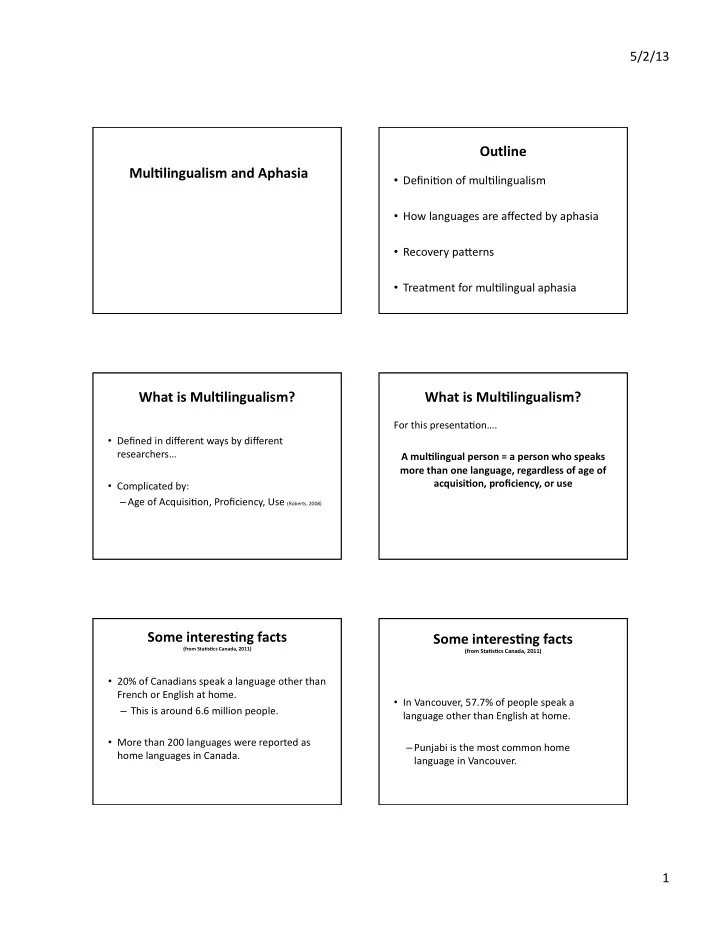

5/2/13 ¡ Outline ¡ Mul$lingualism ¡and ¡Aphasia ¡ • Defini,on ¡of ¡mul,lingualism ¡ • How ¡languages ¡are ¡affected ¡by ¡aphasia ¡ ¡ • Recovery ¡paBerns ¡ ¡ • Treatment ¡for ¡mul,lingual ¡aphasia ¡ What ¡is ¡Mul$lingualism? ¡ ¡ What ¡is ¡Mul$lingualism? ¡ For ¡this ¡presenta,on…. ¡ • Defined ¡in ¡different ¡ways ¡by ¡different ¡ researchers… ¡ A ¡mul$lingual ¡person ¡= ¡a ¡person ¡who ¡speaks ¡ more ¡than ¡one ¡language, ¡regardless ¡of ¡age ¡of ¡ acquisi$on, ¡proficiency, ¡or ¡use ¡ • Complicated ¡by: ¡ ¡ – Age ¡of ¡Acquisi,on, ¡Proficiency, ¡Use ¡ (Roberts, ¡2008) ¡ Some ¡interes$ng ¡facts ¡ ¡ Some ¡interes$ng ¡facts ¡ ¡ (from ¡Sta$s$cs ¡Canada, ¡2011) ¡ ¡ (from ¡Sta$s$cs ¡Canada, ¡2011) ¡ ¡ • 20% ¡of ¡Canadians ¡speak ¡a ¡language ¡other ¡than ¡ French ¡or ¡English ¡at ¡home. ¡ ¡ • In ¡Vancouver, ¡57.7% ¡of ¡people ¡speak ¡a ¡ – ¡This ¡is ¡around ¡6.6 ¡million ¡people. ¡ ¡ language ¡other ¡than ¡English ¡at ¡home. ¡ ¡ • More ¡than ¡200 ¡languages ¡were ¡reported ¡as ¡ – Punjabi ¡is ¡the ¡most ¡common ¡home ¡ home ¡languages ¡in ¡Canada. ¡ ¡ language ¡in ¡Vancouver. ¡ ¡ 1 ¡
5/2/13 ¡ How ¡does ¡aphasia ¡affect ¡each ¡language? ¡ How ¡does ¡aphasia ¡affect ¡each ¡language? ¡ (Roberts, ¡2008) ¡ ¡ ( Roberts, ¡2008) ¡ ¡ 1. ¡Parallel ¡impairment ¡ ¡ Language ¡1 ¡ Language ¡2 ¡ Each ¡language ¡is ¡equally ¡affected. ¡ ¡ 3. ¡Selec$ve ¡aphasia ¡ Before ¡ Post-‑Stroke ¡ Language ¡1 ¡ Language ¡2 ¡ Only ¡one ¡language ¡is ¡affected. ¡ ¡ ¡ ¡ Language ¡1 ¡ Before ¡ Post-‑Stroke ¡ 2. Differen$al ¡impairment ¡ Language ¡2 ¡ Before ¡ Post-‑Stroke ¡ One ¡language ¡is ¡affected ¡more ¡than ¡the ¡other. ¡ ¡ Other ¡paQerns ¡of ¡impairment ¡ Which ¡one ¡do ¡you ¡think ¡is ¡the ¡most ¡common? ¡ (Roberts, ¡2008) ¡ ¡ 4. Differen$al ¡Aphasia ¡ The ¡person ¡has ¡a ¡different ¡type ¡of ¡aphasia ¡in ¡each ¡ language. ¡ ¡ ¡ Parallel ¡impairment ¡ (All ¡languages ¡are ¡equally ¡affected) ¡ 5. Blended/Mixed ¡Aphasia ¡ Source: ¡Roberts, ¡2008; ¡Adrover-‑Roig, ¡MarcoBe, ¡Scherer ¡& ¡Ansaldo, ¡2012; ¡Small, ¡2013 ¡ The ¡person ¡mixes ¡the ¡two ¡languages ¡together. ¡They ¡do ¡not ¡ seem ¡to ¡realize ¡that ¡they ¡are ¡two ¡different ¡languages. ¡ ¡ What ¡about ¡recovery? ¡ ¡ What ¡about ¡recovery? ¡ ¡ (Roberts, ¡2008) ¡ (Roberts, ¡2008) ¡ 1. ¡Parallel ¡recovery ¡ 4. ¡ Successive ¡recovery ¡ ¡-‑ ¡Each ¡language ¡improves ¡the ¡same ¡amount. ¡ ¡ ¡-‑ ¡One ¡language ¡recovers ¡first, ¡then ¡the ¡other ¡one ¡ ¡does. ¡ 2. ¡Differen$al ¡recovery ¡ ¡-‑ ¡One ¡language ¡improves ¡more ¡than ¡the ¡other. ¡ ¡ 5. ¡ Antagonis$c ¡recovery ¡ ¡-‑ ¡One ¡language ¡improves ¡while ¡the ¡other ¡gets ¡ 3. ¡Selec$ve ¡recovery ¡ ¡worse. ¡ ¡ -‑ ¡Only ¡one ¡language ¡recovers. ¡ ¡ 2 ¡
5/2/13 ¡ Treatment ¡for ¡Mul$lingual ¡Aphasia ¡ Which ¡one ¡do ¡you ¡think ¡is ¡the ¡most ¡common? ¡ The ¡big ¡ques,on… ¡ In ¡what ¡language ¡should ¡treatment ¡be ¡given? ¡ ¡ Parallel ¡Recovery ¡ (All ¡languages ¡recover ¡equally) ¡ Source: ¡Roberts, ¡2008; ¡Adrover-‑Roig, ¡MarcoBe, ¡Scherer ¡& ¡Ansaldo, ¡2012; ¡Small, ¡2013 ¡ Any ¡Ques$ons? ¡ ¡ Research ¡Results ¡ • Many ¡studies ¡have ¡shown ¡effects ¡in ¡ both ¡ languages ¡when ¡only ¡one ¡language ¡is ¡treated. ¡ ¡ • No ¡one ¡result ¡has ¡been ¡seen ¡across ¡all ¡studies. ¡ – Every ¡person ¡responds ¡to ¡treatment ¡differently. ¡ Source: ¡See ¡reference ¡list ¡for ¡studies ¡reviewed. ¡ ¡ Thank ¡you! ¡ References ¡ ¡ • Adrover-‑Roig, ¡D., ¡MarcoBe, ¡K., ¡Scherer, ¡L.C., ¡& ¡Ansaldo, ¡A.I. ¡(2012). ¡Bilingual ¡ aphasia: ¡Neural ¡plas,city ¡and ¡considera,ons ¡for ¡recovery. ¡In ¡M. ¡R. ¡GiBerman, ¡M. ¡ Goral ¡& ¡L.K. ¡Obler ¡(Eds.), ¡ Aspects ¡of ¡mul-lingual ¡aphasia ¡(p. ¡16-‑32). ¡Toronto: ¡ Mul,lingual ¡MaBers. ¡ ¡ • Croi, ¡S., ¡Marshall, ¡J., ¡Pring, ¡T. ¡& ¡Hardwick, ¡M. ¡ ¡(2010). ¡Therapy ¡for ¡naming ¡ difficul,es ¡in ¡bilingual ¡aphasia: ¡Which ¡language ¡benefits? ¡ Interna-onal ¡Journal ¡of ¡ Language ¡& ¡Communica-on ¡Disorders , ¡1-‑15. ¡doi: ¡10.3109/13682822.2010.484845 ¡ • Faroqi-‑Shah, ¡Y., ¡Frymark, ¡T., ¡Mullen, ¡R. ¡& ¡Wang, ¡B. ¡(2010). ¡Effect ¡of ¡treatment ¡for ¡ bilingual ¡individuals ¡with ¡aphasia: ¡A ¡systema,c ¡review ¡of ¡the ¡evidence. ¡ Journal ¡of ¡ Neurolinguis-cs ¡23 (4), ¡319–34. ¡hBp://www.journals.elsevier.com/journal-‑of-‑ neurolinguis,cs/ ¡ Goral, ¡M., ¡Levy, ¡E. ¡& ¡Kastl, ¡R. ¡(2010). ¡Cross-‑language ¡generalisa,on: ¡A ¡case ¡of ¡ • trilingual ¡aphasia. ¡ Aphasiology , ¡24(2), ¡170-‑18. ¡doi: ¡10.1080/02687030902958308 ¡ ¡ • Harding, ¡D ¡& ¡Pound, ¡C. ¡(1999). ¡Needs, ¡func,on, ¡and ¡measurement: ¡Juggling ¡with ¡ mul,ple ¡language ¡impairments. ¡In ¡Byng, ¡S., ¡Swinburn, ¡K. ¡& ¡Pound, ¡C. ¡(Eds), ¡ The ¡ Aphasia ¡Therapy ¡File ¡(chapter ¡3). ¡Hove, ¡East ¡Sussex: ¡Psychology ¡Press. ¡ ¡ • Kiran, ¡S. ¡& ¡Edmond, ¡L. ¡(2004). ¡Effect ¡of ¡seman,c ¡naming ¡treatment ¡on ¡crosslinguis,c ¡ generaliza,on ¡in ¡bilingual ¡aphasia. ¡ Brain ¡and ¡Language, ¡91 (1), ¡75–77. ¡hBp:// dx.doi.org/10.1016/j.bandl.2004.06.041 ¡ ¡ • Kiran, ¡S. ¡& ¡Goral, ¡M. ¡(2010). ¡One ¡Disorder, ¡Mul,ple ¡Languages. ¡The ¡ASHA ¡Leader, ¡17 (7), ¡22-‑25. ¡hBp://www.asha.org/leader.aspx ¡ ¡ 3 ¡
5/2/13 ¡ References ¡Con$nued ¡ • Kiran, ¡S. ¡& ¡Roberts, ¡P. ¡(2010). ¡Seman,c ¡feature ¡analysis ¡treatment ¡in ¡Spanish–English ¡ and ¡French–English ¡bilingual ¡aphasia, ¡ Aphasiology, ¡24 (2), ¡231-‑261. ¡hBp://dx.doi.org/ 10.1080/02687030902958365 ¡ • Kohnert, ¡K. ¡(2009). ¡Cross-‑language ¡generaliza,on ¡following ¡treatment ¡in ¡bilingual ¡ speakers ¡with ¡aphasia: ¡A ¡review. ¡ Semin ¡Speech ¡Lang, ¡30 (3), ¡174-‑186. ¡doi: ¡10.1055/ s-‑0029-‑122595 ¡ • Obler, ¡L.K. ¡& ¡Park, ¡Y. ¡(2012). ¡The ¡study ¡of ¡bilingual ¡aphasia: ¡The ¡ques,ons ¡addressed. ¡ In ¡M.R. ¡GiBerman, ¡M. ¡Goral ¡& ¡L.K. ¡Obler ¡(Eds.), ¡ Aspects ¡of ¡mul-lingual ¡aphasia ¡(p. ¡ 3-‑15). ¡Toronto: ¡Mul,lingual ¡MaBers. ¡ • Roberts, ¡Patricia ¡(2008). ¡Issues ¡in ¡assessment ¡and ¡treatment ¡for ¡bilingual ¡and ¡ culturally ¡diverse ¡pa,ents. ¡In ¡R. ¡Chapey ¡(Ed.), ¡ Language ¡interven-on ¡strategies ¡in ¡ aphasia ¡and ¡related ¡neurogenic ¡communica-on ¡disorders, ¡5 th ¡edi-on ¡ (pp. ¡245-‑275, ¡ chapter ¡9). ¡ ¡ • Small, ¡J. ¡(2013). ¡Mul,lingual ¡Aphasia ¡[Class ¡handout]. ¡School ¡of ¡Audiology ¡and ¡Speech ¡ Sciences, ¡University ¡of ¡Bri,sh ¡Columbia. ¡ ¡ • Sta,s,cs ¡Canada. ¡(2011). ¡ Linguis-c ¡characteris-cs ¡of ¡Canadians. ¡ (Report ¡No. ¡98-‑314-‑ X2011001). ¡Retrieved ¡from ¡hBp://www12.statcan.gc.ca/census-‑recensement/2011/ as-‑sa/98-‑314-‑x/98-‑314-‑x2011001-‑eng.cfm ¡ 4 ¡
Recommend
More recommend